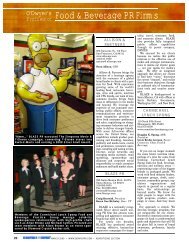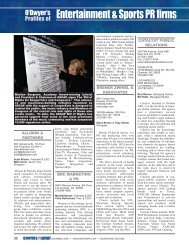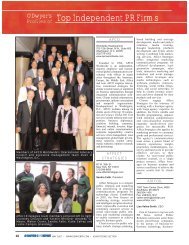May '11 PR Rankings Issue - Odwyerpr.com
May '11 PR Rankings Issue - Odwyerpr.com
May '11 PR Rankings Issue - Odwyerpr.com
You also want an ePaper? Increase the reach of your titles
YUMPU automatically turns print PDFs into web optimized ePapers that Google loves.
EDITORIAL<br />
What’s wrong with reality TV?<br />
It’s long been my position that if you think our current standards have reached an all-time<br />
low, just wait a few years.<br />
Case in point: In 2001, reality TV accounted for about 20% of prime-time television.<br />
Today it accounts for 40%. In the world of cable TV it’s actually much higher, with some<br />
channels now dedicating as much as 90% of their content to reality programming. The New<br />
York Times last year reported that 15 of the top 20 highest-rated programs are now reality<br />
shows, fetching more viewers in the 18-to-49 bracket than any other form of programming.<br />
The latest “Jersey Shore” season finale was the highest-rated yet, shattering records for<br />
MTV with 7.6 million viewers as well as a 7.3 rating in the coveted 12-to-34 demographic.<br />
There’s little question as to why reality TV has gotten so popular. For one, it’s cheap to<br />
produce, the broadcast equivalent of outsourced labor. Subjects are the actors, entire scenes,<br />
entire plots, entire characters are written in the editing room. It’s also nimble; because the<br />
medium suggests authenticity, many viewers instantly find them engaging. Shows can be<br />
scripted — scenes acted, even — then presented in vérité form as documentary, fact. Finally,<br />
there’s product placement. In case you were unaware, reality shows are televised billboards;<br />
their subjects tout more brands than Daytona 500 drivers. They cover cost before the first<br />
<strong>com</strong>mercial break.<br />
And then there’s us — the dumb saps who watch. This activity paints a dire picture of the<br />
human condition, that we’re so fevered with self-hatred we’re willing to vilify people with<br />
faults just like our own, the only exception being they dared to flaunt their short<strong>com</strong>ings in<br />
a court fit only for our celebrity overlords. The very practice is a tactic admission of our preference<br />
of institution over the individual, a public chastisement of those who fail to achieve<br />
the lofty ideals set by those institutions. The question shouldn’t be whether reality TV showcases<br />
anything close to what we call “reality” (it doesn’t). The question should instead be<br />
how low we will stoop to reiterate our bankrupt mores for the purpose of making ourselves<br />
feel better for never achieving those ideals to begin with.<br />
It doesn’t matter what kind of reality show it is — whether it’s a program featuring everyday<br />
people striving to achieve a position of favored status in the <strong>com</strong>munity through talent<br />
<strong>com</strong>petitions (“American Idol”), or job <strong>com</strong>petitions (“The Apprentice”), or by struggling<br />
to over<strong>com</strong>e addiction or societal rejection (“Hoarders, “Intervention,” “Extreme<br />
Makeover,”), or if it’s a program that captures odd professions (“Dog the Bounty Hunter”),<br />
strangers placed in artificial living environments (“Big Brother”), or minor celebrities who<br />
make fools of themselves in the course of their day-to-day lives, thereby revealing themselves<br />
as the throwaways we’ve always presumed them to be (What a relief, they’re idiots<br />
like us!) — the goal of all reality TV is the same. Like any good narrative, reality TV survives<br />
on fantasy. Ideals are its currency.<br />
Reality TV is the overlapping area where the everyday man/woman briefly transcends<br />
into the world of celebrity. In order for this to gain any traction, ideal circumstances must be<br />
presented. Failure is almost certain. It’s no surprise that the most successful of the genre’s<br />
offerings are rife with the two things most Americans simply don’t get enough of: money<br />
and sex. It doesn’t matter how the characters/contestants arc on the “Jersey Shore,”<br />
“America’s Next Top Model,” or “The Real Housewives of Orange County/New York<br />
City/New Jersey/Atlanta.” As long as there’s a chance of riches or a romp, we’re engaged.<br />
Semi-successful cable shows like “Deadliest Catch,” “Ice Road Truckers,” and “Billy the<br />
Exterminator” survive on niche appeal. Once you add money and sex to the profession (“LA<br />
Ink,” “Pregnant in Heels”), a ratings surge follows. It’s far from the American reality.<br />
In order for the illusion of these ideal circumstances to be successful, it requires an axis<br />
of sameness — a lifetime of viewer failure — to revolve around. Reality TV survives on the<br />
absurd fantasy that we are all future celebrities, millionaires in the making, that we’re simply<br />
waiting for the day that we too are subjected to the graces of a benevolent CEO and his<br />
brand tentacles. In the meantime we’ll mock those who fall short of societal expectations,<br />
those denied the CEO hire, the next top model, the star chef, those who were unable to transcend<br />
from individual to brand. We laugh at them for being us.<br />
We’d never make a reality show about real people in real circumstances we created,<br />
because it’d firmly place the onus on us to change. We’d never make a show about the jobless<br />
and homeless families left by the banks we later bailed out, we’d never create a reality<br />
show documenting the families destroyed by the bombs we dropped on Iraq. How about a<br />
show highlighting the last factory worker in the U.S.? Doesn’t sound so appealing, does it?<br />
Our reality remains a convenience. <br />
— Jon Gingerich<br />
6<br />
MAY 2011 WWW.ODWYER<strong>PR</strong>.COM<br />
EDITOR-IN-CHIEFF<br />
Jack O’Dwyer<br />
jack@odwyerpr.<strong>com</strong><br />
ASSOCIATE PUBLISHER<br />
Kevin McCauley<br />
kevin@odwyerpr.<strong>com</strong><br />
EDITOR<br />
Jon Gingerich<br />
jon@odwyerpr.<strong>com</strong><br />
SENIOR EDITOR<br />
Greg Hazley<br />
greg@odwyerpr.<strong>com</strong><br />
CONTRIBUTING EDITORS<br />
John O’Dwyer<br />
Fraser Seitel<br />
Richard Goldstein<br />
ADVERTISING SALES<br />
John O’Dwyer<br />
Advertising Sales Manager<br />
john@odwyerpr.<strong>com</strong><br />
Jack Fogarty<br />
National Advertising Representative<br />
jfogarty@odwyerpr.<strong>com</strong><br />
O’Dwyer’s is published monthly for $60.00<br />
a year ($7.00 for a single issue) by the<br />
J.R. O’Dwyer Co., Inc.,<br />
271 Madison Ave., New York, NY 10016.<br />
(212) 679-2471<br />
Fax (212) 683-2750.<br />
© Copyright 2011<br />
J.R. O’Dwyer Co., Inc.<br />
OTHER PUBLICATIONS &<br />
SERVICES:<br />
www.odwyerpr.<strong>com</strong> breaking news,<br />
<strong>com</strong>mentary, useful databases and more.<br />
Jack O’Dwyer’s Newsletter An eightpage<br />
weekly with general <strong>PR</strong> news, media<br />
appointments and placement opportunities.<br />
O’Dwyer’s Directory of <strong>PR</strong> Firms has<br />
listings of more than 1,850 <strong>PR</strong> firms throughout<br />
the U.S. and abroad.<br />
O’Dwyer’s <strong>PR</strong> Buyer’s Guide lists 1,000+<br />
products and services for the <strong>PR</strong> industry in 54<br />
categories.<br />
jobs.odwyerpr.<strong>com</strong> O’Dwyer’s online<br />
job center has help wanted ads and hosts<br />
resume postings.

















